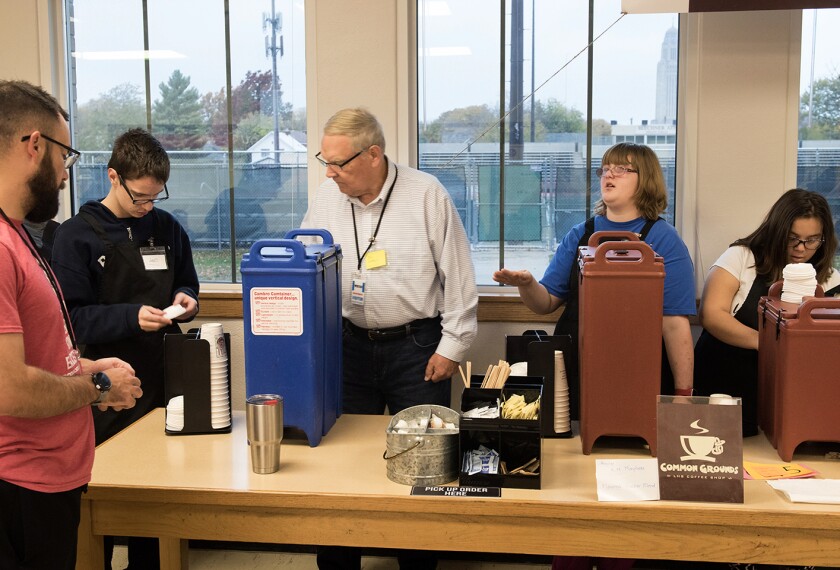Eleven years ago, John Tomanelli and his wife, Doreen Johnson, settled in Marlborough, Conn., “specifically for the education,” as Mr. Tomanelli said.
But, for their youngest son, Ian, Marlborough Elementary School didn’t turn out to be all they had hoped for. Diagnosed with speech and language delays in preschool, Ian had made sufficient progress by the middle of 3rd grade for the district and his parents to agree to end special education services for him. But Ian, now a 4th grader, continued to struggle in reading and writing, and in September, Marlborough educators decided he was a candidate for the district’s Scientific Research-Based Interventions program, Connecticut’s version of the “response to intervention” educational framework. His intervention was daily small-group reading instruction with his teacher.
That wasn’t enough to meet Ian’s needs, according to Ian’s parents, who say the boy continued to struggle. They didn’t know when the school would take its next step to help their son and, without the due process provisions available to them in special education, they weren’t sure what their next steps should be, either.
“Where does this leave us—besides getting a tutor and accepting our son is a C student?” Ms. Johnson asks. “Do we need to look for an attorney?”
Ian’s family’s experience with response to intervention mirrors the concerns of many families across the country. As much as educational proponents and policymakers extol the benefits of RTI, it can be a hard sell to parents. Some say schools that use the educational framework for identifying and serving students with learning deficits don’t always do a good job of providing interventions that work or of explaining what happens if an intervention doesn’t work. Others argue that the approach is implemented inconsistently from district to district.
Marlborough Elementary Principal Scott Nierendorf declined to comment on the particulars of Ian’s case, but said he and his staff are working to improve communication with parents about SRBI, an initiative the state rolled out in 2008. “If parents have questions, I want them to come in. If we can’t explain it well, we may need to try a different approach. They may not always agree with us, but I hope they’ll have a better idea of why we’re doing what we’re doing.”
Parents’ Concerns
Nationally, parents and their advocates say inconsistent implementation is the number-one problem with RTI. ”I’ve never seen a process with so much potential and an implementation process that was so inconsistent,” said Mark Halpert, a father of children with special needs and a co-president of the Learning Disabilities Association of Florida.
Another concern among parents is that they feel RTI may slow or stop the process of identifying their children for special education services. José and Maria Patillo of Evanston, Ill., a diverse suburb north of Chicago, offer one example. When Abel, their second-youngest son, entered Evanston District 65’s Head Start program in September, his difficulties were apparent.
Unlike the couple’s other children, Abel “can’t concentrate well in school,” according to Ms. Patillo. “He throws temper tantrums, doesn’t sit still, and interrupts all the time.”
The Patillos had already noticed Abel needed special help and taken steps to meet his needs. They participated in a home-visiting program run by Family Focus, a local nonprofit group, and Abel had received speech therapy.

“When Abel started school, I talked to a teacher about my concerns,” Ms. Patillo said. For months, the help Abel received through RTI meant the classroom aide sat near him during group times to model appropriate behavior and redirect him as necessary. To his parents, that wasn’t enough.
In November, Ms. Patillo wrote a letter to the program asking that Abel be evaluated for special education services.
In early January, the Patillos contacted local special education advocate Cari Levin. With her help, they persuaded the district to move forward with an evaluation. “I had to push pretty hard,” Ms. Levin said. “Abel has lost half a school year of intervention. It’s important not to lose time right now.”
District officials said in an interview that they wanted to give RTI a chance and keep Abel in regular education as much as possible, without delaying needed services. “The purpose is not to delay services, the purpose is to give support to the teacher,” said Ellen Fogelberg, the director of early-childhood services. “We’re new to this, and it’s relatively new in early childhood.”
Ms. Fogelberg acknowledged the district has room to improve in communicating with parents about RTI. “I think we have the same intentions,” he said. “That might not always be clear to them.”
Elsewhere, advocates for parents say they see children remaining in RTI for multiple years without showing progress. “The majority of my caseload are high-functioning kids with autism who are being held in this holding pattern of RTI without their education needs being identified or addressed,” said Mara LaViola, an advocate who works with families of special-needs children in Dallas. “When they’re in RTI, the schools really don’t do anything. There’s no data collection, no research-based intervention.”
Of eight sets of parents interviewed by Education Week, three parents—from Illinois, Massachusetts, and Texas—said their children have been in RTI for two to four years without showing progress. None would speak on the record for fear of schools retaliating against their children.
Department Weighs In
Federal officials are hearing stories like these and responding. “RTI was never intended to delay or deny a child with a disability,” said Alexa Posny, the assistant secretary for special education and rehabilitative services for the U.S. Department of Education. “A parent always has the right to request an evaluation at any time.”
On Jan. 21, the Education Department sent a memo to state school officers reminding them that RTI cannot be used to delay or deny evaluation and that established due process provisions must continue to be followed.
However, it has declined to set time limits on how long states and districts can use RTI with students. “We can’t say there’s a fixed period of time, but when there’s evidence interventions aren’t working, that’s it. It was never intended to go on forever,” Ms. Posny said. She acknowledged the department has heard of cases where children remained in RTI for multiple years. “There is no reason to have to provide something for three or four years. That is unconscionable.”
Meanwhile, some parents in schools where RTI’s potential has been realized raved about what it has done for their children. Mendy Gomez of Tucson, Ariz., credits the educational framework as implemented in the local Vail school district with helping her son Adam, a 5th grader, reach grade level in reading. She said his success owes equally to RTI, the efforts she and her son have made, and Vail’s district leadership.
“I’ve had the luxury of seeing two different districts,” she said. “The difference in this district is management. The constant underlying theme is: Is this kid able to get to grade level? How can we work with him or her to get to grade level?”
At age 6, Adam was diagnosed with dyslexia and attention deficit hyperactivity syndrome, given an individualized education program and placed in special education. When Adam moved from the Phoenix district to Ocotillo Ridge Elementary in the Vail district, educators followed his earlier IEP and pulled him out of his regular classroom to provide support in reading and writing. But at the same time, he became part of the schoolwide RTI process.
Ms. Gomez said she appreciates Ocotillo Ridge’s benchmark assessments and built-in time for teachers to reteach students who haven’t mastered a standard. “A lot of parents are frustrated with [benchmark assessments], but I see the benefits of it. It catches them early enough. … You can see and track where your kid’s strengths and weaknesses are,” said Ms. Gomez.
During 4th grade, Adam made big strides—reaching grade level in reading and coming close in writing. This fall, Adam’s IEP team determined he was ready to be in the regular classroom full time.
Adam’s story is not unusual among transfers to Vail, said Assistant Superintendent John Carruth. “When we put them in our system for a while, we see them close down that gap” between their ability and their achievement, he noted. “When you see that kind of kid make that kind of rapid gain, I believe the kid didn’t have a true disability in the first place.”




